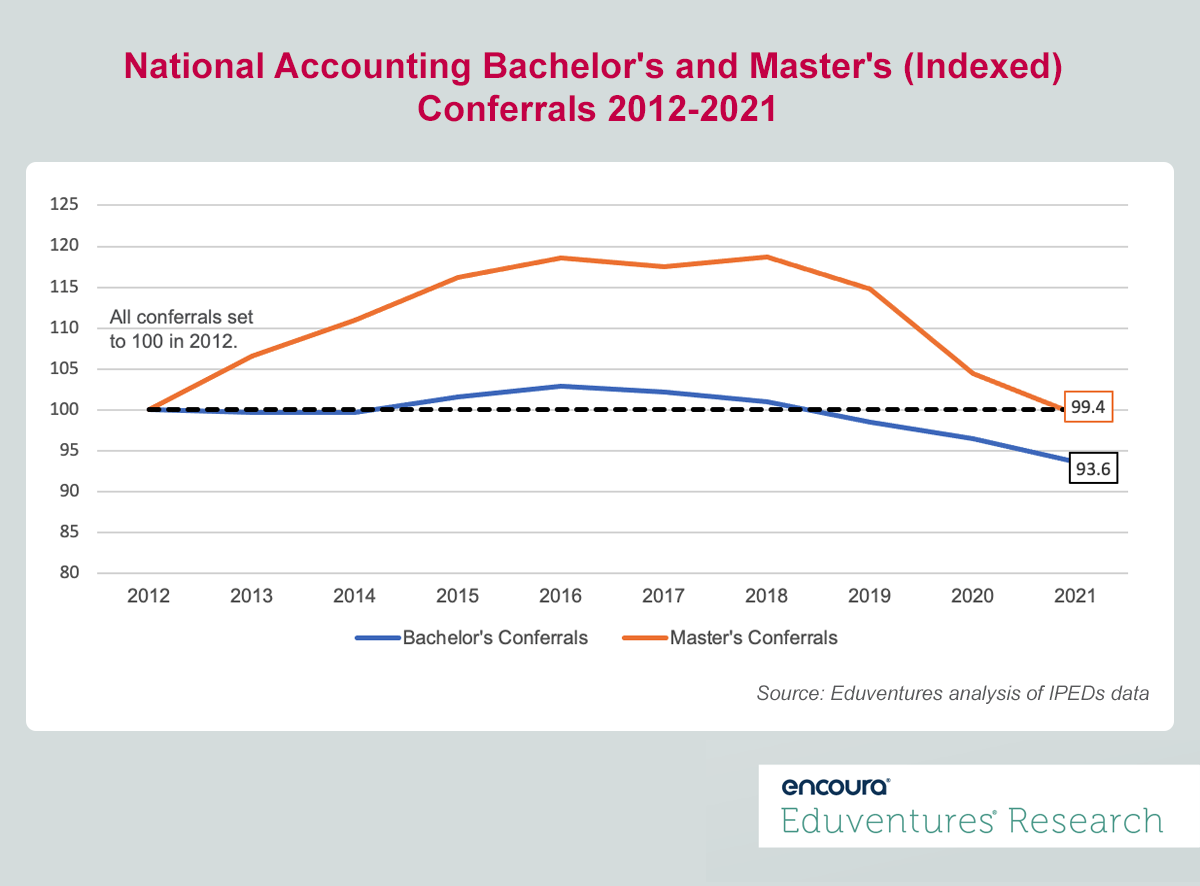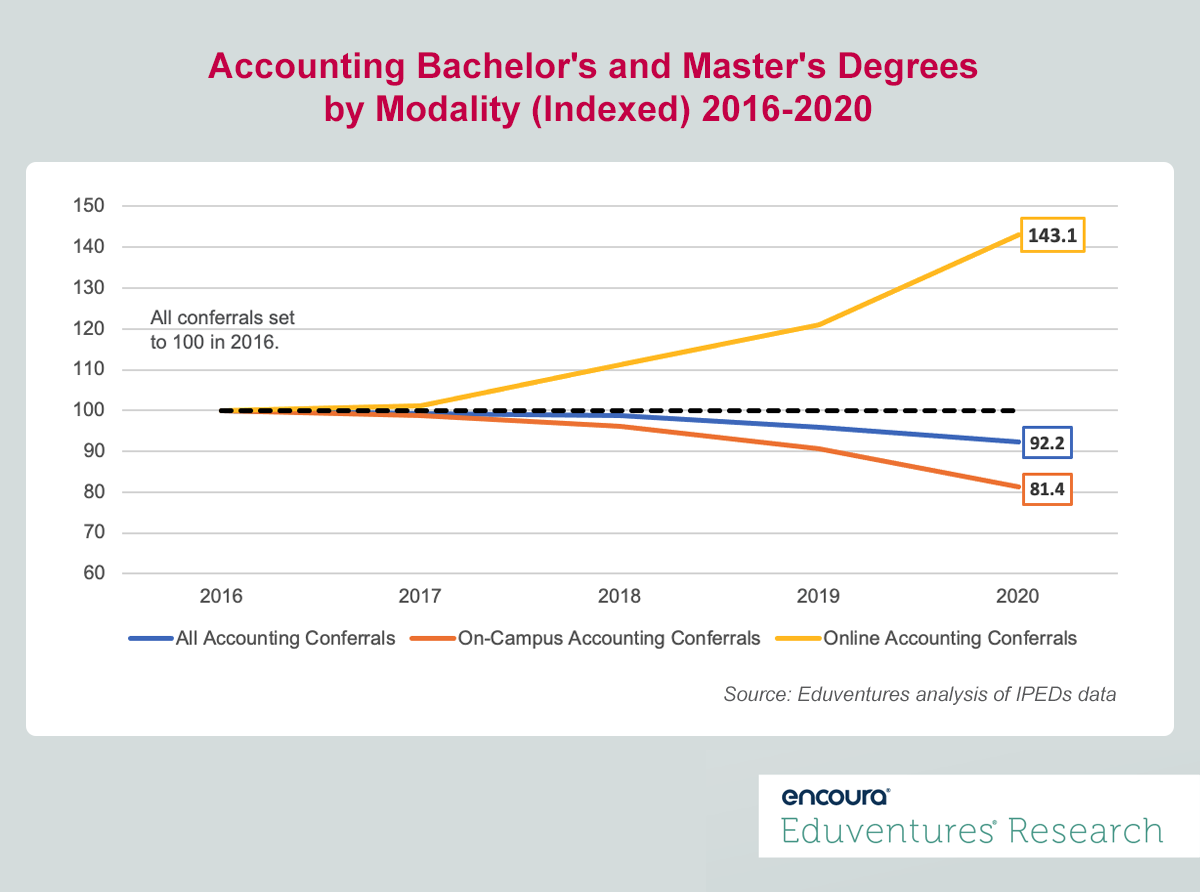A historically stable and reliable industry – accounting – has faced challenges in recent years. While “stability” may sound like music to the ears of parents, it may not sound so exciting to younger generations. This is reflected in declining accounting conferrals and fewer graduates pursuing accounting positions.
The updated exam will include a greater focus on technology and data analysis with a goal of making it more relevant for businesses today and to recruit more young workers.
So, what does this mean for existing accounting programs? How should higher education respond?
Shrinking Student Demand
As noted above, student interest in accounting degrees has declined in recent years. Figure 1 shows the decline of accounting bachelor’s and master’s conferrals. While bachelor’s conferrals increased through 2016 (peaking at 52,897) and master’s conferrals increased through 2018 (peaking at 19,723), both have declined steadily in recent years. As of 2021, bachelor’s conferrals (48,095) and master’s conferrals (16,519) are below what they were in 2012.
Figure 1
On-campus demand has seen an even steeper decline. Between 2016 and 2020, on-campus accounting bachelor’s and master’s conferrals fell by 19%.
There are also fewer students taking the CPA exam and entering the accounting labor market (discussed more in-depth in the Financial Times). In 2016, 103,000 people took the CPA exam. In 2021, only 72,271 did (a decline of 30%). The Big Four accounting firms report concern around the shortage and have been implementing new accelerator programs to attract employees into accounting and encourage more candidates to sit for the exam.
Online conferral trends, however, shine a ray of light. While overall accounting conferrals and on-campus accounting conferrals have declined, online accounting conferrals have increased every year since 2012 (Figure 2).
Figure 2
Figure 2 shows that while all conferrals fell by 8% and on-campus conferrals fell by 19% between 2016 and 2020, online accounting bachelor’s and master’s conferrals increased by 43%. Clearly something about online accounting programs continues to interest students. This is particularly interesting to keep in mind as we think about the impact of the updated CPA exam.
The CPA Exam Redesign
In 2020, The American Institute of CPAs (AICPA) and the National Association of State Boards of Accountancy (NASBA) partnered on the CPA Evolution initiative to overhaul the current CPA exam. The redesign is a response to the “rapidly changing skills” the field requires today and will launch in January 2024.
According to AICPA the NASBA, the new exam will place a greater emphasis on skills like critical thinking, data management and analysis, and other “technology skills.” AICPA research found that accounting firms were increasingly hiring non-accounting graduates with greater technology and data skillsets for accounting positions.
The goal for the new exam is to better prepare accounting students for today’s evolving workplace and the enhanced data and technology skills required to work as an accountant in the 21st century. AICPA and NASBA also express hope that the updated exam will appeal to more young workers by allowing them to elect specialist modules like business analytics or information systems.
The Higher Education Response
Publicly, higher education’s response to the changing CPA exam has been minimal – at least thus far. Few institutions have outwardly acknowledged the change and how they plan to respond, including on bachelor’s and master’s accounting program webpages that have historically marketed how the programs prepare students for the CPA exam.
Southern New Hampshire University’s (SNHU) online Bachelor’s in Accounting is one of few program webpages Eduventures has seen acknowledge the change (Figure 3). Notably, SNHU’s master’s in accounting webpage does not yet address the updated CPA exam and if that program will prepare students for it. Likely SNHU is still determining how to adapt its master’s program to align with the updated exam, a position in which most schools find themselves.
Figure 3
But the lack of public response from higher education should not be mistaken as indifference. Eduventures has spoken with several schools that are deeply engaged in discussion around accounting curriculum and program pivots. Many worry they do not have adequate time to make decisions that will potentially overhaul entire programs and/or curriculums. Others are questioning whether or not their accounting programs should continue focusing on CPA exam preparation, especially given recently declining student demand indicators.
While the hesitation makes sense, Eduventures sees some positive indicators of future growth for the accounting market. As previously stated, online bachelor’s and master’s accounting conferrals continue to grow despite the overall decline, indicating more potential for online accounting degrees. Additionally, the CPA exam updates are intended to renew and refresh the accounting field – ideally to attract more young adults to become accountants. If this comes to fruition, demand for accounting degrees could hypothetically increase.
The Bottom Line
There are arguments to be made for schools to adapt their accounting program curriculums to prepare students for the updated CPA exam. There are also arguments against programs changing and instead focusing on providing students with other in-demand skills for jobs that do not require CPA licensure. Program and curriculum overhaul requires significant time, money, and resources that are not often at a school’s disposal.
Eduventures recommends that schools begin marketing their responses to this update sooner rather than later. Current college freshmen are the first class of students who will take the updated CPA exam and thus prospective students and parents are likely already looking to colleges and universities for answers. Institutions that can assure prospects they are already adapting their program offerings for the future will stand out among competitors.
For institutions deciding how to respond, a good way to start is to conduct a regional student demand and competitive analysis. While this may not necessarily provide a clear-cut answer, it will help schools think strategically about how best to move forward.
Never Miss Your Wake-Up Call
Learn more about our team of expert research analysts here.
Eduventures Quantitative Specialist, Client Research at Encoura
Contact
The Program Strength Assessment (PSA) is a data-driven way for higher education leaders to objectively evaluate their programs against internal and external benchmarks. By leveraging the unparalleled data sets and deep expertise of Eduventures, we’re able to objectively identify where your program strengths intersect with traditional, adult, and graduate students’ values, so you can create a productive and distinctive program portfolio.
The COVID-19 pandemic has shifted much of student recruitment into the digital space. As we begin to emerge on the other side, it is time to examine how student preferences for communication have changed.
Learn about:
- Which digital trends are worth continuing for today’s students?
- Which marketing practices are unlikely to last as we emerge from pandemic restrictions?
Where and when do students want to engage with colleges and universities?




